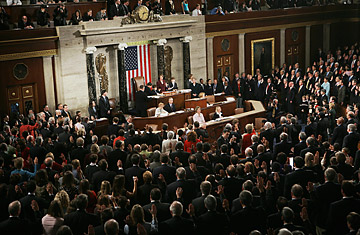
True, the 110th Congress may not have made quite as much progress as many hoped. In a time of war, financial crisis, rising health care costs and volatile gas prices, its success in passing actual pieces of legislation has been below average: it enacted only about 3% of legislation introduced into law (the average rate for the past 35 years is about 4.5%). Still, as the 111th convenes on Jan. 6, at least the outgoing class can claim to have excelled at one great congressional tradition: approving a lengthy list of inconsequential, not very discriminating and occasionally downright peculiar Congressional resolutions. In all, the 110th Congress introduced nearly 3,000 resolutions and passed more than 1,000.
There are three types of legislative resolutions. First, there are joint resolutions, which are approved by both houses of Congress and can be as serious as real bills, with actual outcomes like appropriating emergency funds (if the President signs them) or adding Constitutional amendments (if they are ratified by the states). Then there are concurrent resolutions, like the annual congressional budget resolution, which also must get approval of both houses but do not carry the force of law. The third type is a simple resolution, which is also not a law and needs the approval of only one house. This type is what really gives legislators the best chance to express their feelings, congratulate people and invent ever more finicky national observances.
In fact, probably the most popular reason to propose a resolution appears to be making every day on the national calendar feel extra special. Holidaymaking is an old pastime for legislators. It was the nation's First Congress that kicked off that tradition; in 1789, New Jersey Congressman Elias Boudinot introduced a resolution asking President George Washington to proclaim a national day of giving thanks — which he did, and the holiday stuck. But today's Americans may find some more recent observances to be slightly less universally appealing: Among the red-letter days proclaimed by the past few Congresses are Funeral Director and Mortician Recognition Day (March 11), the Day of the American Cowboy (July 26), Siblings Connection Day (March 1) and Corvette Day (June 30).
Sometimes Congress sees fit to award a week or month to a particular topic. Such events are often meant to raise awareness for serious illnesses like diabetes, although sometimes, they are used to raise awareness of, say, the plumbing industry. Really lucky causes might get an entire year: 2007 went to the American Society of Agronomy, on the occasion of its 100th anniversary. Other resolutions have marked seemingly arbitrary anniversaries, as in the 2008 decision to herald the 63rd birthday of Texas's Big Bend National Park.
When Congress wants to get something off its chest, it can also pass a resolution to congratulate or to express sympathy. These are often fairly unanimous, like resolutions expressing sympathy for South Asian tsunami victims, or those celebrating teachers, firefighters, mothers, or Toby Keith (U.S. Rep. Tom Cole of Oklahoma called the country musician "a good Democrat" who "reflects his deep admiration for the troops in his hit song 'American Soldier'").
Few subjects are beneath the notice of a Congressional resolution. Soil, for instance, might be celebrated, as it was in 2008. Or watermelon. Athletes are popular, too. Nothing pleases constituents quite like Congressmen and Senators giving agreeable shout-outs to local sports heroes. Last year, the 110th Congress praised superstar Olympian Michael Phelps; it also celebrated Wichita State University's championship women's bowling team. Legislators, it seems, aren't very picky. Unless of course they are passing actual laws.
